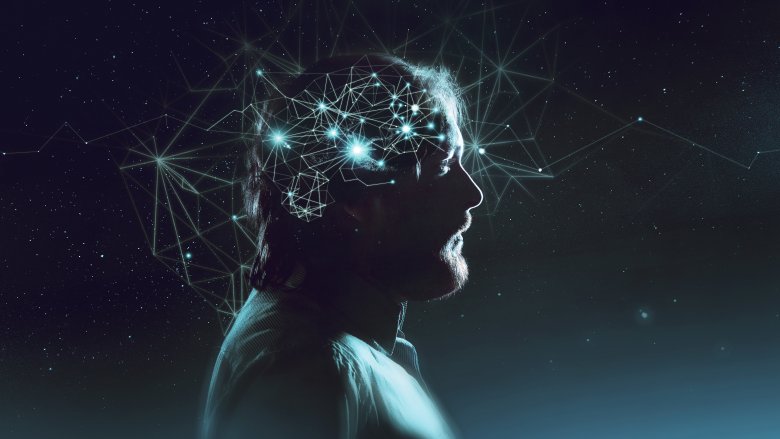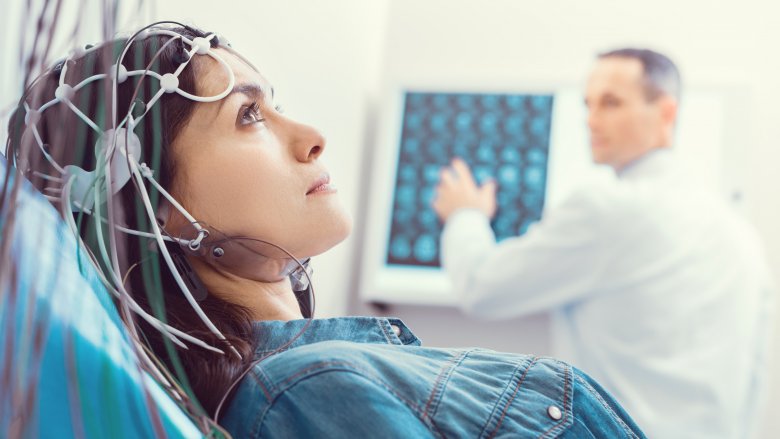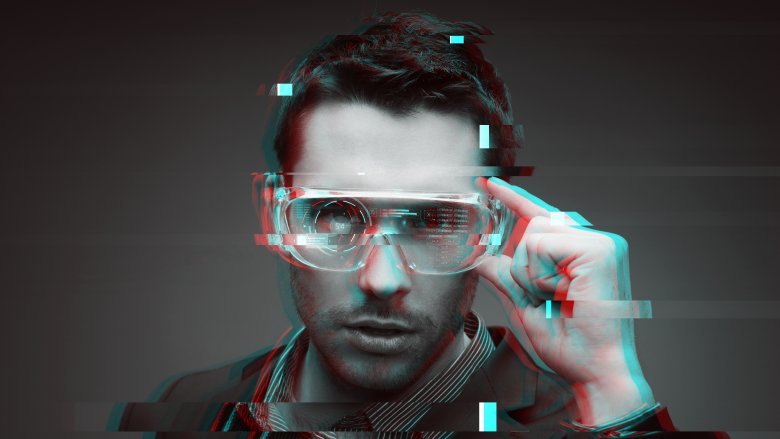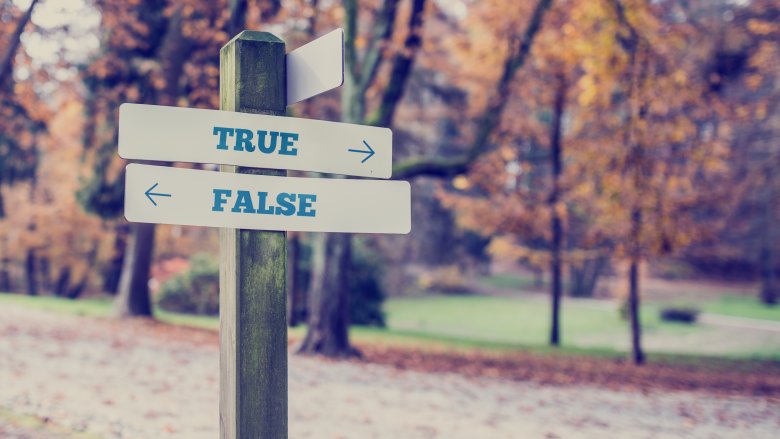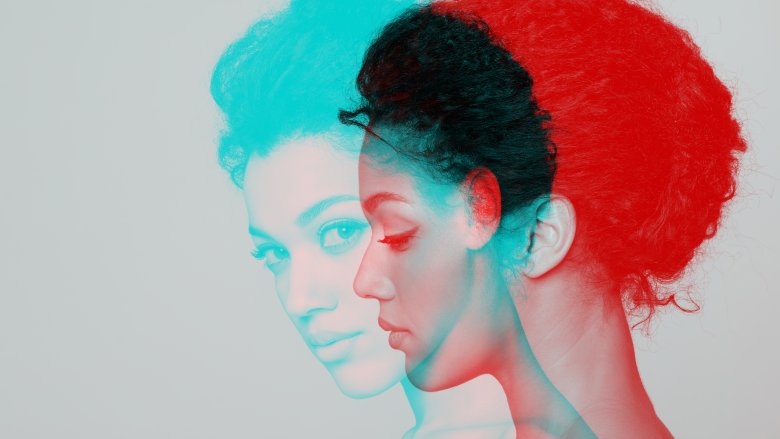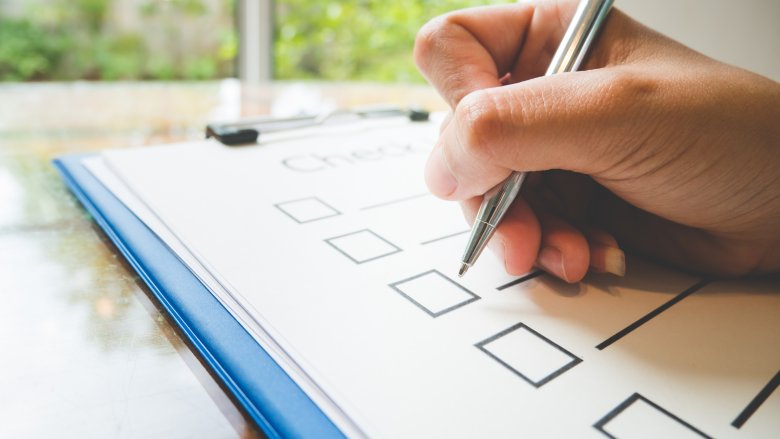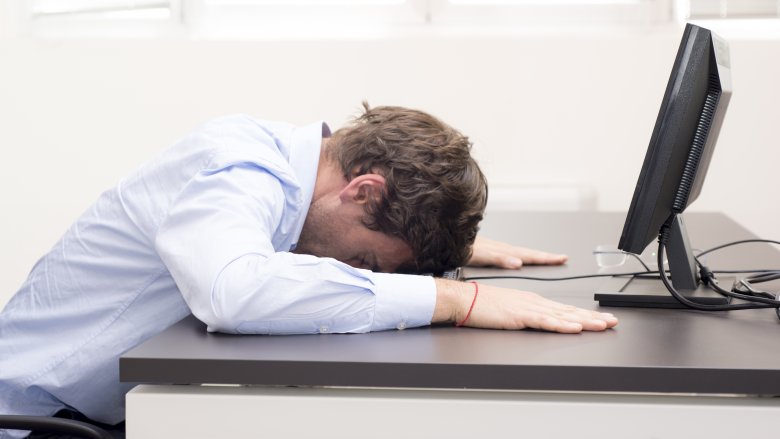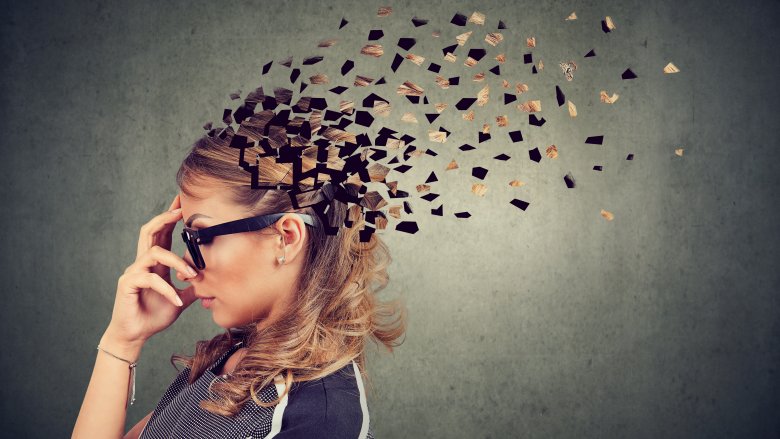Ways Science Is Trying To Explain Deja Vu
Just about all of us have experienced that feeling of deja vu (a French term meaning "already seen") — that sense that we've been here before, done this before, or seen this before. In fact Science Daily says the sensation is experienced by roughly 60-80% of the population, and yet it remains a mystery, mostly because it happens to people unexpectedly and is therefore extremely difficult to study in a laboratory.
But scientists have theories because scientists always have theories. And there have been a few small studies that seem to have identified potential causes of deja vu (a French term meaning "already seen" ... wait ... hmm.)
Anyway, no one is saying definitively exactly what causes the phenomenon or if there is even a single explanation for it. But there are some pretty good theories out there about what causes deja vu. Here are some of the most reasonable ones.
Your brain is taking a shortcut
The human brain is a seriously complex piece of biological machinery. It's capable of processing vast amounts of information while simultaneously keeping your heart and lungs functioning with no conscious input on your part, and also playing stupid songs on loop in your head and giving you bizarre dreams about being lost on the subway. And yet, your brain is not infallible. You know this because you've almost certainly had the experience of having no idea why you just walked into a room or completely spacing on the name of a street you've driven past every day for like the last 20 years.
According to Science Daily, one of the prevailing theories about deja vu has to do with shortcuts in neural pathways. It's possible that when you experience something that recalls a fragment of an old memory — for example, you smell something that you once smelled once a long time ago in a different situation — your brain interprets the new experience as something it needs to place in long-term memory rather than the short-term memory slot it would normally be placed in. Then, when your brain accesses the information in long-term memory, it may feel like its accessing an experience from the past rather than something that's happening in the present. That might be just enough to produce that strange sensation of "I've been here before."
It could be an actual memory
Have you ever had a conversation with a friend or family member that went something like this, "Do you remember that time when..." and you were like "Nope. No I totally don't remember that time when." And yet, your friend or family member insists that you were there and can even quote you on things you said. But that memory is just completely gone from your brain — or at least it seems that way.
Your brain is actually being efficient when it suppresses old memories. It's really not very useful, for example, to remember things like what you had for dinner on February 7, 1999. Unless you expect to really need an alibi for February 7, 1999, for some reason, that kind of information is just useless clutter that can interfere with the processing of more relevant information.
According to the Smithsonian, though, those old memories might still play a role, if not a very useful one. Something you did long ago and totally forgot about might still be lingering in some remote part of your brain where it can trigger a strong sense of familiarity even though you can't recall any of the details. Places might do that, too, perhaps if they resemble somewhere you've already been but not strongly enough that you can recall which place is triggering that sense of familiarity.
Maybe your brain is just confused
Your not-infallible brain may also get confused when it's trying to process multiple pieces of information. You know how sometimes you're sitting in the passenger seat of your family car and your kids or friends or whatever are in the back talking loudly or having a discussion that you are pretending to pay attention to but that you aren't really interested in, and you pick up your phone because you think to yourself "I'm going to pay my credit card bill now" and somewhere between that thought and viewing the multiple icons on your phone that are the exact same color as the credit card logo you completely forget why you've just picked up your phone.
Sometimes, there's just too much information in your environment and you simply can't process it all. It's not you, it's your kids/friends. And the person at the credit card company who designed the stupid logo. According to Health.com, some scientists think that something similar might be happening when you experience deja vu — perhaps your brain is unable to properly process/align multiple pieces of information, it falls into that good ol' deja vu feeling: "This is really close to something I'm supposed to be doing, or ... did I already do this?"
People with temporal lobe epilepsy often experience deja vu just before a seizure
The typical deja vu experiencer is a healthy, average Joe or Josephine, so you may wonder why scientists sometimes talk about temporal lobe epilepsy when discussing the phenomenon of deja vu. According to Science Daily, the experiences of people with this brain disorder may help us understand deja vu in healthy people because that feeling of familiarity is a common symptom of temporal lobe epilepsy — for many sufferers, it acts as a warning of an approaching seizure.
An epileptic seizure occurs when dysfunctional nerve cell activity disrupts the normal electrical impulses that stimulate those nerve cells. The impulses then spread across the brain, which is what causes an epileptic seizure. For people with temporal lobe epilepsy, those seizures might be preceded by a strong feeling of deja vu, which suggests that the sensation could be caused by a sort of electrical malfunction in your brain, much like a poor wiring connection might cause your porch light to flicker.
Your brain is glitching
Just like computers, brains can "glitch," too, and when your brain glitches the end result may be that weird feeling of deja vu. According to Science Daily, your brain stores memories in the same part of the brain that's responsible for the detection of familiar places, people, and events. So you might be getting deja vu because for just a moment, your brain malfunctions. It's possible that for whatever reason, the neurons responsible for the detection of familiarity are firing even though there isn't anything familiar in the environment — that might lead to the sensation that you're experiencing the past when you're solidly in the present.
As it turns out, the part of the brain that stores memories and that sense of familiarity is the temporal lobe, and if you're having deja vu right now it's because we were just talking about that a few minutes ago. In fact healthy people can experience precisely the same malfunctioning electrical impulses as people with epilepsy — the difference is that in healthy people the experience is fleeting and does not lead to an epiliptic seizure.
Your brain has formed false memories
It could be even weirder that – perhaps your brain has formed fake memories and is referencing those memories as you experience deja vu. Now, these aren't the kinds of fake memories that form when someone insists that you totally did something years ago that you totally didn't do, but you hear the story so often that you start questioning your actual memories, until at some point you wonder if maybe you are the one who is mistaken. No, the type of false memory that some psychologists think is responsible for deja vu is different than that — according to Health Guidance, it's a real memory that fails to form correctly.
It's possible that your brain may, for reasons that aren't totally clear, create the memory of an experience two times. And if you've got two different memories of the same event and you're trying to interpret that rationally, the only logical conclusion you can really come to is that you've somehow experienced that event before.
Your brain is doing a double-take
Everyone has had the conscious experience of doing a double-take, you know, like when you walk into a room and you see a clown out of the corner of your eye, and then you think to yourself, "Oh, there's a clown" and keep going, and then you think, "Holy crap why is there a clown??" And when you look again, it's not there. And then you mumble an excuse and go back outside because sometimes that's best.
Anyway, that's similar to what some scientists think might be happening when you experience deja vu, only it's not something that occurs on a conscious level. Every experience consists of thousands of individual details, and your brain can only take in so much information. Some of those details are naturally going to get filtered out. According to Health Guidance, it could be that you're busy focusing on a certain part of the scene, like that freaking weird clown, and meanwhile your brain is subconsciously processing other details in the scene. And some of those details might get passed from your subconscious to your conscious and when that happens, your brain might do a little bit of a double-take as it passes the information from one place to another. That brief lapse of time between when that detail moves from one part of your brain to another might be responsible for that feeling of deja vu.
Your brain is recalling a memory it only has part of
Let's say you walk into a coffee shop you've never been to before and there's a familiar song playing on the radio. Once upon a time, many years earlier, you walked into a different coffee shop that was playing the same familiar song. That's not the sort of thing you would file away in your brain catalog of information, but the experience lingers in your memory. Then when you have that vaguely similar experience your brain takes that small fragment of memory and uses it to reconstruct an entire memory featuring all five senses.
According to Health Guidance, this is called the "hologram" theory because it's sort of like your brain is reconstructing a three-dimensional event out of a one-dimensional memory fragment. It's filling in the blanks either with details it has completely fabricated or perhaps details taken from a different experience or even a work of fiction you once read or saw on a screen. Even though the details aren't accurate, your brain may confuse them for a real memory, which can trigger the deja vu sensation.
Your brain is checking what you've experienced against what you think you've experienced
In 2016, a team of researchers at the University of St. Andrews in the U.K. figured out how to use word association games to trick people's brains into lying to them and thereby sort of getting deja vu in a lab setting. They then studied the regions of the brain that were active as their subjects experienced the sensation. According to New Scientist, the team's findings were inconsistent with the "false memory" theories of deja vu.
If deja vu were indeed a function of memory, you would expect to see brain activity in the parts of the brain responsible for memory, but that's not what the research found. Instead, fMRI scans found that the frontal parts of the brain were active during the deja vu experience — that part of the brain isn't responsible for memory, it's responsible for decision-making. The lead researcher involved with the study thinks the brain is simply checking the thing you've just experienced against the things you think you've experienced. If there's a conflict or memory error, it sends a signal, which could be interpreted as a feeling of familiarity or deja vu sensation. The subjects could also have just been deciding if they should punch the scientists or not.
Your brain is over-stuffed
People who do a lot of traveling may experience deja vu more often than those of us who prefer the staycation. According to Health.com, this probably has more to do with the amount of information your brain collects and processes than anything else. It makes sense that if you spend a lot of time exploring and visiting unfamiliar places, you're going to have lots of very different memories, and some of those memories are going to be similar to each other. That means people who do a lot of place-hopping may be more prone to feelings of deja vu than people who would rather stay home and watch the grass grow.
Similarly, people who keep dream journals or are just better at remembering their dreams may also experience deja vu more than people who don't often recall their dreams. It's not because dreams are prophetic or anything, though; it's because these people simply have more imagined experiences that their brains can compare to their real experiences, hence more deja vu.
Your brain is lagging
When your computer lags, it's like the most annoying thing ever. And have you ever noticed how it only does this when there's something really pressing that's demanding your attention? Like, the baby is crying or the house just caught on fire? As it turns out, your brain, the most powerful natural computer, also may occasionally lag.
Our brains are usually pretty good at processing information in real time. If you're watching the road while you're driving, you can be reasonably sure that the idiot who just made a left turn in front of you did it in real time and not like three and a half seconds before you noticed.
So that's useful, but there may be occasions when your brain lags just a microsecond or two behind real time, and that can cause the sort of confusion that might trigger a feeling of deja vu. According to the Science Museum of London, this might happen when you're transferring information from one part of the brain to the other. There may be a split-second delay during that transfer of information, which means one side gets the info twice: once in real time and once during the information transfer. During that split-second delay, you might get that strong feeling of "I've been here/done this before," even though it's really just a lag in brain processing.
It could be brain damage
This is probably not the reason why you personally have so much deja vu, but it's worth bringing up because for some people deja vu is actually a chronic problem that could impact their quality of life. According to Scientific American, people who have a certain type of brain damage might experience deja vu constantly, to the point where even something as simple as grocery shopping becomes impossible because they can't remember whether they already bought a gallon of milk and a loaf of bread.
People who have chronic deja vu might avoid social interaction or even reading the news or watching television because they constantly have the experience of feeling like they already know what they're going to see there. Of course when tested ahead of time, researchers have (unsurprisingly) discovered that these patients don't have any actual predictive abilities. But just because they can't literally predict what's in the news or on television doesn't stop them from feeling as if they have.
Still, unfortunately, the existence of chronic deja vu does at least poke some holes in the idea that deja vu happens because you've had an actual, bona fide premonition.
Or it could just be because you're young and your brain still works
Typically speaking, deja vu is actually a lot more common in young people than it is in older people. According to Curiosity.com, the deja vu experience maxes out sometime between the ages of 15 and 25 and then tapers off until it's a rare or totally absent occurrence later in life. Some scientists think this might be because deja vu is actually a symptom of a healthy brain, one that is actively checking memories against experiences and filing everything away for future reference. It's even possible that as we age we continue to experience deja vu, we just don't recognize it as deja vu because our brains don't acknowledge the difference between a false memory and a real one. So that's not actually great news for the above-25 set because fewer deja vu experiences actually might mean a deteriorating brain.
So if you're 25 and under, enjoy that deja vu experience because although it probably doesn't mean you had a premonition, it might mean you have a normally functioning brain. For the rest of you, welcome to possible cognitive decline. Have a nice day!
